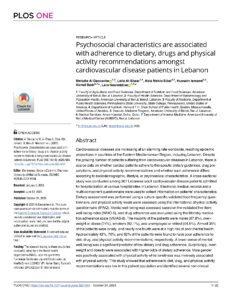Cardiovascular diseases are increasing at an alarming rate worldwide, reaching epidemic proportions in countries of the Eastern Mediterranean Region, including Lebanon. Despite the growing number of patients suffering from cardiovascular diseases in Lebanon, there is scarce data on whether cardiac patients adhere to therapeutic dietary guidelines, drug prescriptions, and physical activity recommendations and whether such adherence differs according to sociodemographic, lifestyle, or psychosocial characteristics. A cross-sectional study was conducted among 367 Lebanese adult cardiovascular disease patients admitted for hospitalization at various hospital sites in Lebanon. Electronic medical records and a multi-component questionnaire were used to collect information on patients’ characteristics. Dietary assessment was performed using a culture-specific validated food frequency questionnaire, and physical activity levels were assessed using the international physical activity questionnaire (IPAQ). Mental well-being was assessed based on the validated five-item well-being index (WHO-5), and drug adherence was evaluated using the Morisky medication adherence scale (MMAS-8). The majority of the patients were males (67.8%), overweight or obese (74%), smokers (62.1%), and unemployed or retired (54.5%). Almost 35% of the patients were lonely, and nearly one fourth were at a high risk of poor mental health. Approximately 43%, 70%, and 52% of the patients were found to have poor adherence to diet, drug, and physical activity recommendations, respectively. A lower sense of mental well-being was a significant predictor of low dietary and drug adherence. Surprisingly, overweight and obesity were associated with higher odds of dietary adherence. Male gender was positively associated with physical activity while loneliness was inversely associated with physical activity. This study showed that adherence to diet, drug, and physical activity recommendations was low in this patient population and identified several non-clinical characteristics that may affect adherence. These findings highlighted the need for considering patients’ psychosocial characteristics in the treatment of patients with cardiovascular diseases.
Publication Details
- Year of Publication: 2023
- Region/s: Middle East & North Africa
- Theme/s: Micro-Data Collection
- Research Topic/s: Health
- DOI: https://doi.org/10.1371/journal.pone.0287844




